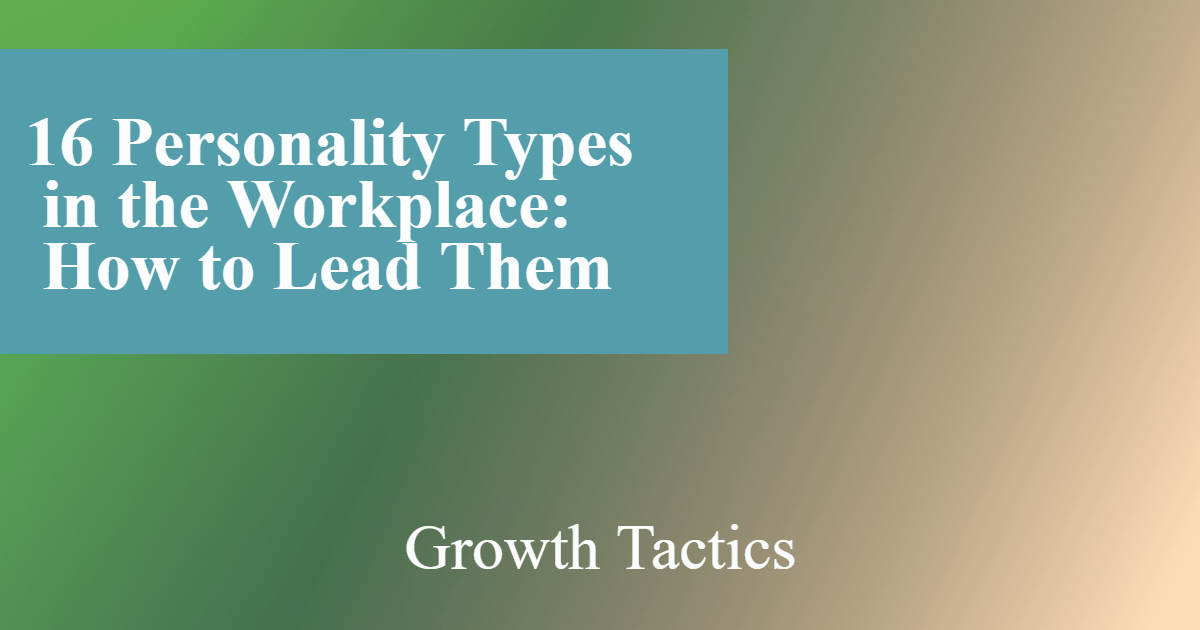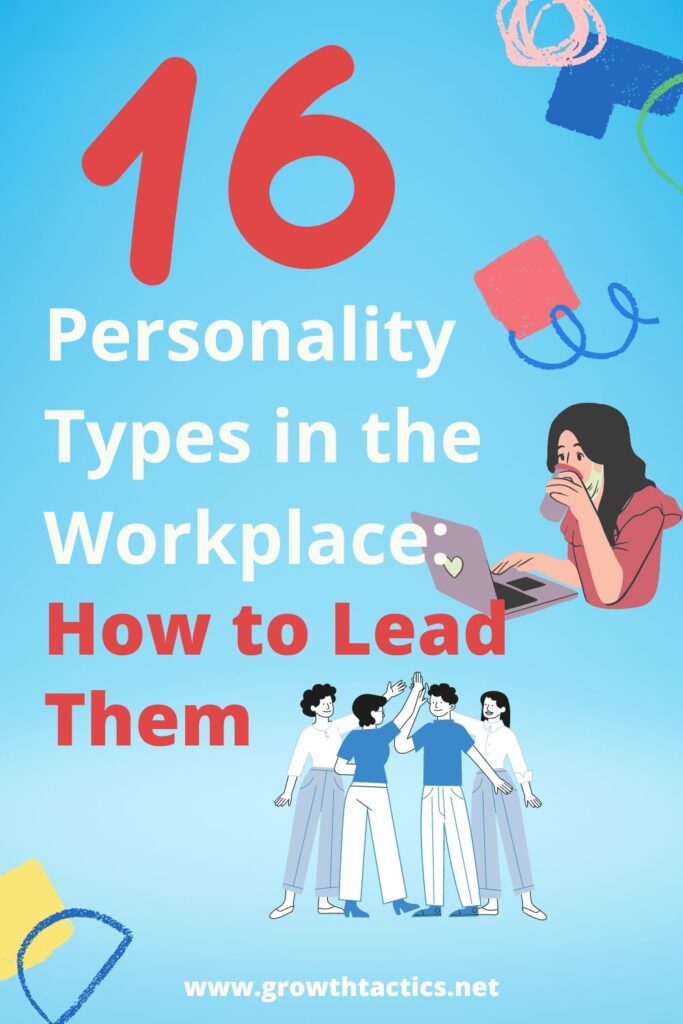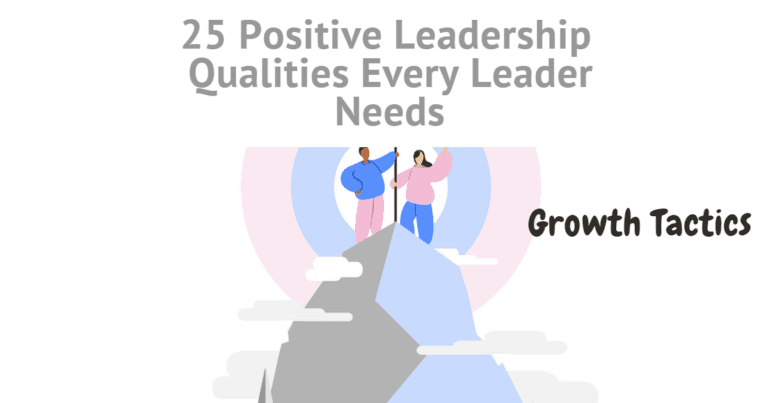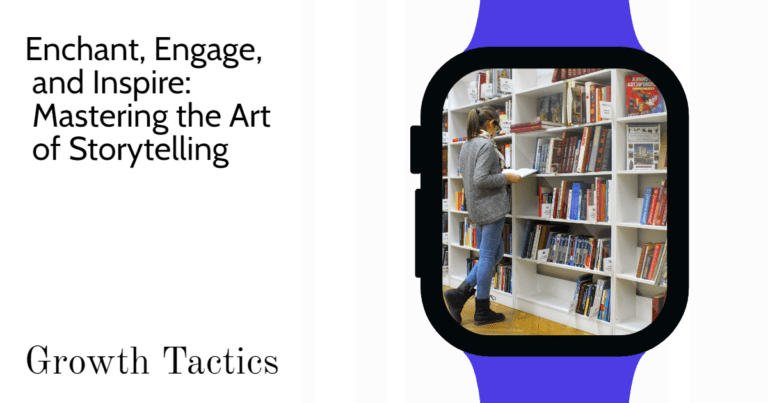Imagine walking into work, coffee in hand, and knowing exactly how to boost your team’s productivity and morale before the day even starts. Sounds like a superpower, right? It’s not as far-fetched as you might think.
Every workplace is a mix of personalities, each with its own strengths, preferences, and quirks. By understanding these diverse personalities, you can unlock the secret to smoother interactions, efficient teamwork, and a happier office environment.
Welcome to the world where work personality types in the workplace become your roadmap to navigating and thriving. Let’s dive in and discover how to interact with these personalities to make every workday a little better.
Jump To Section
Overview of the 16 MBTI Personality Types
Each of the 16 workplace personality types brings a unique set of traits and preferences to the table. Understanding these can enhance teamwork and personal growth. Here’s a brief look at each:
1. The Idealist (INFJ)
Dreamers and visionaries, INFJs aspire to make a positive impact, blending empathy with idealism to inspire change.
2. The Logistician (ISTJ)
ISTJs are the dependable organizers, known for their meticulous attention to detail and dedication to order and tradition.
3. The Commander (ENTJ)
With natural leadership qualities, ENTJs are strategic thinkers who excel at setting goals and mobilizing people to action.
4. The Debater (ENTP)
ENTPs thrive on intellectual challenges and debate, always eager to explore new ideas and dismantle arguments with sharp wit.
5. The Advocate (INFP)
INFPs are empathetic and values-driven, often focused on personal growth and helping others achieve their potential.
6. The Mediator (ISFP)
ISFPs are peacemakers, possessing a quiet yet impactful presence, with a keen sense of harmony and aesthetics.
7. The Protagonist (ENFJ)
ENFJs are charismatic leaders who are adept at motivating others, driven by a desire to foster growth and help others achieve their goals.
8. The Campaigner (ENFP)
With a contagious enthusiasm, ENFPs are creative and free-spirited, always seeing the potential in people and situations.
9. The Virtuoso (ISTP)
ISTPs are practical and inventive, often excelling in situations that require quick thinking and problem-solving abilities.
10. The Adventurer (ISFP)
Adventurers are creative and spontaneous, living in the moment and enjoying life’s pleasures with a playful, open-minded approach.
11. The Entrepreneur (ESTP)
ESTPs are energetic and action-oriented, diving headfirst into challenges and leading the way with dynamic problem-solving.
12. The Entertainer (ESFP)
Life of the party, ESFPs bring energy and joy to their environments, thriving on social interactions and ensuring everyone is having a good time.
13. The Defender (ISFJ)
ISFJs are nurturing and reliable, providing steadfast support and care to ensure the well-being and harmony of their groups.
14. The Executive (ESTJ)
ESTJs are quintessential leaders, organizing projects and people with a clear vision and unwavering commitment to achieving objectives.
15. The Consul (ESFJ)
Warm and sociable, ESFJs excel at creating and maintaining relationships, and fostering community and harmony wherever they go.
16. The Architect (INTJ)
INTJs are strategic and insightful, planning meticulously with a focus on achieving long-term objectives and solutions.
Exploring these personalities can offer insights into your own preferences and how you interact with others, ultimately fostering a more understanding and cohesive environment.
Leveraging Personality Types for Team Success
Know Your Team’s Strengths and Weaknesses
As a leader, understanding employee personality types can greatly enhance performance. Start by identifying who thrives independently and who shines in collaboration. This knowledge allows you to assign tasks that play to each member’s strengths, leading to increased productivity and job satisfaction.
Tailor Communication
Each personality type communicates differently. Adjust your style to meet theirs, fostering clearly defined and effective dialogue. This minimizes misunderstandings and strengthens your team’s cohesion.
Appreciate Diversity in Problem-Solving
Diverse personalities mean diverse solutions. Embrace the variety of perspectives within your team. This diversity is your secret weapon for innovative problem-solving and overcoming challenges.
Create an Empowering Environment
Understand what motivates each personality type and structure their work accordingly. This could mean offering more autonomy to some while providing structured goals to others. Tailor your leadership to suit the individual needs of your team members, setting them up for success.
Foster Growth and Development
Use your insights into each team member’s personality to guide their professional development. Offer opportunities that match their personal strengths and career aspirations. This not only enhances team performance but also boosts morale and loyalty.
By embracing the unique qualities of each team member, you can unlock the full potential of your team. Learn to manage different personality traits. Remember, the key to outstanding leadership lies in understanding and leveraging the diverse personalities that make up your team.
Communicating Effectively with Different Work Personality Types
Engage with Introverts
Introverts often like time to think before responding. Give them space. Send an email rather than springing a sudden meeting. Listen carefully when they speak. They may not talk much, but when they do, it’s worth hearing.
Inspire Extroverts
Extroverts thrive on interaction. Engage them in group discussions. Be direct and energetic. They feed off enthusiasm and enjoy lively debates. Keep them in the loop and watch them ignite with ideas.
Guide Sensing Types
People with a sensing preference focus on details. Be factual with them. Provide clear instructions. They appreciate step-by-step guidance and concrete examples. Show them the “how-tos,” and they’ll get the job done.
Connect with Intuitives
Intuitives look at the big picture. Share your vision. Speak in possibilities and future potentials. They love to brainstorm. Give them an abstract concept, and they’ll run with it, imagining all the possibilities.
Make Decisions with Thinkers
Thinkers value logic. When discussing options, use clear reasoning. Present facts, not feelings. They respect a strong argument supported by data. Be prepared for straightforward, sometimes critical feedback.
Validate Feelers
Feelers prioritize relationships. Communicate with empathy. Acknowledge their contributions. They make decisions based on values and how it impacts people. Show that you care, and they’ll go the extra mile.
Organize with Judgers
Judgers prefer order. Set deadlines. Outline expectations clearly. They love to plan and feel accomplished when they meet their goals. Provide structure, and they’ll deliver consistently.
Adapt with Perceivers
Perceivers enjoy flexibility. Avoid boxing them in. They excel in adaptable environments. Allow for changes and last-minute tweaks. This flexibility lets them produce innovative and out-of-the-box solutions.
By tailoring your approach to each personality type, you’ll foster a more productive and harmonious work environment. Speak their language, and you’ll see remarkable engagement levels. Try these strategies and watch your team’s communication transform.
Maximizing Team Dynamics with Personality Types
Discover the Innovators
Innovators are the dreamers. They’re imaginative and always full of ideas. Place them in roles where creativity is key. Let them brainstorm and design new projects. They’ll light up with enthusiasm and inspire the entire team.
Empower the Executors
Executors are your doers. They love turning plans into action. Give them clear tasks and deadlines. Watch them as they tackle each project with precision. They bring visions to life, ensuring the team’s success.
Value the Analysts
Analysts thrive on data and logic. They excel in roles that require critical thinking. Let them analyze and solve complex problems. Their strategic input can help the team make informed decisions, avoiding pitfalls.
Engage the Diplomats
Diplomats are the glue of any team. They are great at mediating and understanding others’ feelings. Place them in roles that need teamwork and communication. They’ll ensure a harmonious work environment, keeping morale high.
Support the Organizers
Organizers love structure. They’re fantastic at planning and keeping the team on track. Utilize their skills in project management roles. They’ll make sure every detail is accounted for, and deadlines are met.
Appreciate the Helpers
Helpers are compassionate and supportive. They excel in roles that involve supporting other team members. They ensure everyone has what they need to succeed, boosting team spirit and productivity.
Discover the Visionaries
Visionaries are forward-thinkers. They’re always looking ahead. Involve them in strategic planning. Their insights can guide the team toward future success by anticipating trends.
Combine Strengths for Ultimate Success
Every team member brings something special. Recognizing and utilizing these unique strengths creates a well-balanced and efficient team. Mix and match these personalities for a dynamic team that can tackle any challenge with ease.
By understanding these roles and the personalities that best fit coworkers, you can assemble a team that’s not just productive but also harmonious and innovative. Watch your team’s dynamics improve as you align roles with personality types.
Navigating Problems and Conflicts Through the Lens of Personality Types
Understand Individual Responses
Everyone has their unique way of handling stress and conflict, often tied to their personality type. Introverts might need time to process, while extroverts might want to discuss immediately. Recognize these differences to approach problems effectively.
Utilize Strengths in Problem-Solving
Leverage the natural strengths of different personality types. Invite your Innovators to generate creative solutions, while your Analysts can evaluate the feasibility of these ideas. Organizers can outline the action plan, ensuring everyone knows their roles.
Address Concerns According to Needs
When conflicts arise, addressing them according to personality needs can lead to smoother resolutions. Feelers need their emotions acknowledged, while Thinkers want logical explanations. Tailoring your approach based on your people skills can prevent escalations and foster understanding.
Facilitate Communication Based on Styles
Communication is key in conflict resolution. Ensure that your team members speak in a way that resonates with different personality types. Extroverts may prefer group discussions, whereas introverts might appreciate writing their thoughts down first.
Harness Diversity for Comprehensive Solutions
A team diverse in personality types can produce more well-rounded solutions. The variety in perspective and approach ensures that all bases are covered. Recognize and encourage this diversity in problem-solving sessions.
Promote Empathy and Understanding
Encourage your team to understand and empathize with different personality types. This understanding can turn potential conflicts into opportunities for growth. Showcasing examples of how diverse perspectives lead to success can reinforce this.
Adapt Conflict Resolution Strategies
No one-size-fits-all when it comes to resolving conflicts. Some team members may respond better to one-on-one meetings, while others prefer a team discussion. Adapting your strategy to suit the personality types involved can lead to more effective resolutions.
Reflect and Learn as a Team
After resolving a conflict, reflect on the process as a team. What worked well? What could be improved? How did personality types influence the outcome? This reflection will not only help in resolving future conflicts but also in strengthening team dynamics.
By considering personality types in problem-solving and conflict resolution, you enhance not just the efficiency of the process but also the cohesiveness of your team. Embrace these differences, and watch your team grow stronger and more resilient.
Boosting Morale and Productivity for Every Personality Type in the Workplace
Tailor Appreciation
Recognize achievements in a way that resonates with individual personalities. Public praise might thrill an extrovert, while a private note could mean more to an introvert.
Clear Goals for Different Thinkers
Set clear goals, but explain them in ways that make sense to diverse thinkers. Detail-oriented types may appreciate a step-by-step plan, while big-picture thinkers need to see the overall goal.
Breaks for All Types
Encourage breaks in various forms. Extroverts might enjoy social time, while introverts may prefer a quiet space to recharge.
Flexibility Fits All
Offering flexible work options benefits everyone. An adaptable schedule can appeal to spontaneous types, while the option to work remotely might be a boon for those who prefer a controlled environment.
Growth Opportunities for Every Learner
Align learning opportunities with personality strengths. Some may prefer hands-on learning, others might enjoy lectures or reading.
Celebrating Wins Across the Spectrum
Celebrate team successes in ways that include all personality types. Group celebrations and individual recognition can cover extroverts and introverts alike.
Communication that Connects
Keep open communication that caters to different styles. Offer various channels, from in-person meetings to emails, to ensure everyone’s comfort in sharing their thoughts.
Feedback that Fits
Give feedback in ways that match personality preferences. Direct and to the point may work for some, while a more gentle, personal approach may be better for others.
Supportive Environments for Different Needs
Craft a supportive environment where various personality types can thrive. From quiet zones to collaborative spaces, cater to the diverse needs of your team.
Decision-Making Inclusivity
Include team members in decision-making in ways that suit their personalities. Some may want to brainstorm in a group, while others might prefer to provide input in writing.
By understanding and addressing the different personality types in your team, you can enhance morale and productivity in a way that respects and values the unique contributions of each member.
Unlocking Team Potential with Personality Tests
Discover Who You’re Working With
Personality tests help you know your team. You’ll see who’s who. Get a glimpse of how each person thinks and works.
Plays to Strengths
Learn your team’s strengths. Use this knowledge. Put people where they shine. For example some people prefer to work alone while others like to work in groups.
Improves Teamwork
Understanding personality types helps you know how different personalities mesh. This can make or break a team. Use tests to build teams that work well together.
Tailors Management
Manage better by understanding your team. Adjust your style to fit their needs. This can make you a more effective leader.
Enhances Communication
Identify communication styles. Use this insight. Ensure everyone gets heard in the way they communicate best.
Reduces Conflict
Spot potential clashes. Deal with them early. Personality tests help avoid conflicts before they start.
Guides Professional Development
Help your team grow. Use personality insights to tailor development. Give everyone the chance to improve in the way that suits them best.
Aids Recruitment
Hire wisely. Use tests to find the right fit. Match new recruits with the team’s dynamics for smoother integration.
Boosts Job Satisfaction
Place people in roles they naturally enjoy. They’ll be more satisfied. Happy employees are productive employees.
Makes Work Fun
Play to personality types. Design fun activities. Make coming to work something to look forward to.
Using personality tests wisely can transform your workplace. You’ll understand your team better, improve how you work together, and enjoy coming to work each day. Keep it simple, and let the real strengths of your team shine through.
Embrace the Power of Personality
Now you know. Personality assessments aren’t just a trend. They’re tools. Tools that unlock the full potential and give you a better understanding of your team. It starts with recognizing the unique mix of personalities in your workplace.
Look around. Spot the thinkers, the doers, the dreamers. Everyone brings something special. Understanding this can change how you work together.
Don’t wait. Start today. Get curious about the different personalities at your workplace. Watch how it transforms teamwork, communication, and morale.
Embrace the diversity. Unlock the potential. Make your workplace a space where everyone thrives.
Your team is a puzzle. Personality tests can help you fit the pieces together perfectly. Go on, give it a try. See the difference it makes.








